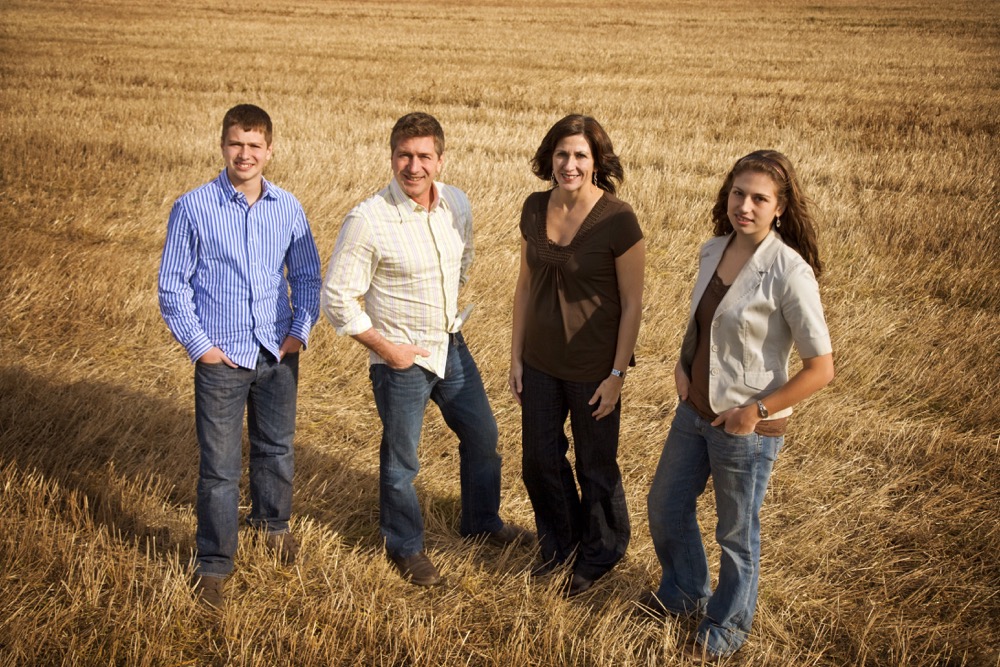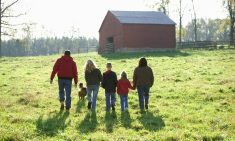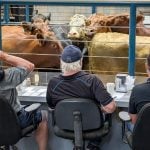Whatever word you use — whether you call it wisdom or if you think of it as insight — it may always be essential for running any farm but it is doubly important during transition.
That’s “doubly” for a good reason, because not only does the senior generation need insight into the transition process if that process is going to succeed, but the younger generation needs to absorb the older generation’s wisdom — all the things learned from a lifetime of experience and observation — if they’re to have a chance to thrive.
“The transfer of wisdom is critical before we start talking about the transfer of assets,” says family farm mediator Andy Junkin, who is based in Iowa but works with farm families across the United States and Canada.
Read Also

‘No agenda, no attenda’: How to professionalize your family farm meetings
Establishing meeting ground rules can help a farm family find ways to communicate that work for the business and the family.
He adds a disquieting note of his own experience-based insight, though.“The more successful you are as a farmer, the harder it is for you to let go of control and impart wisdom.”
That’s a conundrum, because the goal isn’t only to transfer the wisdom. It’s also to give the incoming generation their chance to evaluate and even to challenge it in a functional way, instead of sitting on the sidelines and waiting, waiting, waiting.
[RELATED] The Succession Advantage: Planning for the finish line
So Junkin recommends making the transfer of wisdom a goal, and thinking about exactly how you will do it.
“The outgoing generation needs to mentor and accelerate people’s learning in their roles by showing them how to do it, and then supporting them like a coach,” agrees Kent Gulash, a Saskatoon-based farm family succession coach with Elaine Froese’s team. “One of the toughest things for many parents is to look at their son or daughter as a business partner. We don’t want to see our children get hurt or make mistakes, but we want our business partners to show up and do the right things for the business, which will involve taking appropriate risks, being responsible and being accountable.”
That requires a huge shift in mindset for most farm families, which is why Gulash wants families to start thinking about the farm as a small to mid-sized enterprise (SME).
“An SME has things like job descriptions and clearly defined roles and expectations; they have performance management systems, so, especially in transition, when people need to learn new things, they can document and assess them on whether they’re learning, and what they need to learn, so that comfort in transition starts to happen.”
[RELATED] A new path to the farm’s future
That learning takes time and can be done in bits and pieces. As an example, the two generations might decide to use next spring to really focus on how to get ready for seeding, because there’s so much more to it than the simple shop jobs the younger generation might have done so far.
The goal then would be for the younger generation to see all the decisions that need making, and to get a solid feel for how all the parts come together.
Then, a similar approach can be used with other tasks as the seasons (and years) unfold.
Beyond those tasks, the next generation also needs to experience how to deal with other service providers and professionals, so it’s essential to take them to meetings with the input supplier or the accountant.
The 9,000-hour rule
Junkin calls it the 9,000-hour rule, based on the premise that it takes three years for the two generations to assess whether they can work together and come up with shared goals, and also decide whether the next generation can make a smooth transition to becoming successful new managers.
Family members with that kind of commitment put in about 3,000 hours a year. During these three years, Junkin says the family needs regular (often monthly) mediated performance reviews, which are formal meetings where the purpose is to brainstorm ways to improve the operation and to address core problems that have prevented everyone from working well together in the past.
“That paves the way for them to begin transferring the knowledge and wisdom to the next generation before they start doing estate planning,” Junkin says.
As Junkin sees it, each performance review should address three categories: One pet peeve that each person has with someone else, one core value where they are having problems working together, and one skill that the incoming generation can learn.
These could be anything from buying equipment or bookkeeping to purchasing inputs or trading commodities. Again, the outgoing generation takes on the role of mentors, and there is a gradual transfer of knowledge and management responsibilities.
“It’s important that the first time a daughter buys a combine isn’t six months after Dad’s funeral,” Junkin says.
“What’s not talked about enough is the steep learning curve that often happens after a patriarch or matriarch dies suddenly, and the mistakes that can happen and cause the farm to implode.”
That wisdom transfer takes a decade, Junkin says. It can’t be done on the ambulance ride to the hospital.
“I’d have the son or daughter do the bookkeeping and make out the cheques for parents to sign for at least five years prior to successors having authority to sign cheques,” he says. “Jobs such as financial management aren’t like taking your kid for a few rounds around the field and then they’ll figure it out on their own.”
The problem can be made worse because these are precisely the jobs that parents hold onto.
“As parents’ bodies wear out, they retain jobs such as commodity trading or bookkeeping because that is a role they can still do,” Junkin says. That doesn’t mean the parents should be put out to pasture, though.
If Dad wants to trade commodities until he is 87 and then wants to retire, Junkin encourages this because this mental engagement helps keep that farmer mentally aware and possibly extends his life. However, he also suggests that over the first five years after the son or daughter comes home, they should learn how to do these critical jobs, and then give the jobs back to the parents to do as they get older.
“This is important so successors don’t feel lost when they have to assume these tasks again,” he says. “The last thing you want your successor to feel is overwhelmed.”
Every farm has at least 10 jobs that take a decade to learn, and the son or daughter should be groomed for these jobs during the first 10 fiscal quarters after they come home to farm, Junkin says.
The 9,000-hour rule not only allows enough time to transfer much of the knowledge the next generation of managers will need, it also gives the incoming generation time to prove to Mom and Dad that they are “tall enough to get on the ride.”
Performance reviews are essential, Junkin says. Then, if the younger generation isn’t scoring well on those reviews, it’s time to talk. It may not be an easy conversation, but it’s far easier to have that conversation early on rather than after 10 years.
The performance reviews are also a tool to objectively measure progress and keep things in perspective for all parties involved.
“You can set the goal posts of what you expect, and those goal posts don’t shift based on emotional moods,” Junkin says. “Through the performance review you can objectively measure things, so the parents can see, over three years, that the son or daughter’s performance is continuously improving, and they are more likely to be comfortable with transitioning assets or making them partners.”
Tackle the family stuff
Maybe not surprisingly, when a Saskatchewan farm family coach Kent Gulash receives a call for help, it’s often Mom on the line.
“There are so many times when it is the mother who is reaching out and saying, ‘Something has got to change because my family is falling apart, and I can’t get people together to talk. Can you help us to fix this.’,” Gulash says.
Getting started can seem overwhelming, Gulash says. It’s hard to see where to begin.
Gulash advises each partner involved in the transition process to find a comfortable chair and look forward.
“How do you want the future to look? Create a vision for yourself, and then figure out how to tell the story around that vision to your family and see if they can support and connect to it,” he says.
“But don’t tie yourself to it; don’t tie yourself to anything. Start forming the vision and putting it out there. Then the conversations start to test, modify and bring everyone’s visions together.”
There are multiple reasons why it’s important for farm families to learn how to communicate and make decisions together. “Respect” is number one, but it’s also so everyone knows where they currently stand and what is expected of them in order to ensure the farm (and the family) is successful into the future.
Farm advisor Andy Junkin was born in Ontario but now owns Stubborn.Farm at Mount Vernon, Iowa. He works with farmers via Zoom from P.E.I to B.C. to Mississippi — enough to see the dangers that bubble up when the farm’s future becomes a guessing game at the funeral.
“That uncertainty can cause the potential successor to behave in a dysfunctional way because he or she just feels like a glorified employee, not an owner,” he says. “It’s important for them to feel like an equal partner in the farm. A business can’t function without a strategy and that’s what succession planning is — a long-term strategy.”
Almost always, the stumbling block is that the two generations don’t know how to communicate with each other, often leading to frustration, incorrect assumptions and unrealistic expectations that can fester.
What people have the hardest time with is being vulnerable with each other, Gulash adds. In fact, he says, a huge part of being a farm family coach or advisor is about getting people to be comfortable with vulnerability.
“The majority of what I do is help people get ready to have conversations,” Gulash says.
That doesn’t mean there won’t be any bumps. “It’s highly emotional and we often hit walls with them because we take them to sensitive places,” Gulash says. But the ground is finally ready for progress.
Perfect is almost good enough
Imagine how the young generation feels. If you haven’t tried, do it today, especially the part about the incoming generation feeling they have to do everything perfectly in order to win the trust and confidence of the outgoing generation.
People learn by solving problems, says farm advisor Kent Gulash. “Sometimes we make mistakes, so we try to help families think about what process they can put in place to allow mistakes to happen, and how to make them into learning opportunities.”
The other good reason to address relationship issues at the beginning of the transition journey is because relationships are often the taboo subject that no one wants to bring out into the open.
“We have the same problem within farm family dynamics as we do in some marriages,” agrees advisor Andy Junkin.
“We have verbally and emotionally abusive relationships and these are taboo topics nobody talks about out in the community.”
There’s another factor too that doesn’t get talked about enough.
“There’s a lot of farming partnerships that fail and I think the reason why is that there is an attitude of entitlement,” Junkin says. “But if people can enter the relationship assuming they are the underdog instead of having the attitude that they are never going to have problems … the farm will have a high probability of success.”
Can farm families sort these issues out themselves and create a successful and stress-free transition plan? The answer is yes, but it doesn’t happen often. There are families that can and have done it, but it typically means they have somebody in the family who has the ability to bring people together to have a conversation, which is rare.
“We’re doing this because we see the need, we care about what’s going on, and we’re brave enough to get into a space with people that very few are,” Gulash says. “There are many resources out there on what to do and how to do it but it takes commitment, work and very often a coach to facilitate and make it happen.”
Junkin has written five books on his niche and gives away many free resources on his website, but he gets frustrated that farmers often call him after a disaster happens.
“Farm families want to save a few thousand dollars — the cost of a lawnmower — They’ll read a book, and have an unqualified uncle try to facilitate a family meeting,” he says. “Often this one-time family meeting goes badly with words that can’t ever be taken back and their multimillion-dollar empire goes up in flames after. Why risk it?”
“It’s fairly easy to have one-on-one conversations, but when we bring them together, and we want them to tell their story to everybody in the room, there is a reluctance to communicate how they feel. They are worried about how they will be perceived, and what the parents or the children are going to think of them. As a coach, I support everyone in the journey of sharing and openness to find their answers.”
There are many tools to help people get more comfortable with each other, and Gulash and his team generally start by mapping the family.
“We create a rudimentary map to understand what everyone’s roles are, what the hierarchy is and who all the stakeholders are,” he says. “We use different programs, for example, we have personality style indicators, or if conflict is the challenge, we’ve got some resources for people to create a conflict dynamic profile of themselves. We learn about them, but more so they learn about themselves and how they react in different situations. In most cases we’re just dealing with refining some behaviours, setting some ground rules and defining their roles because there is so often a lack of role clarity in intergenerational farms.”
















